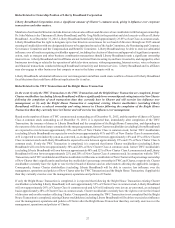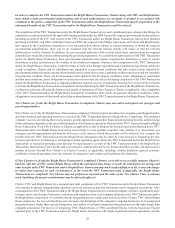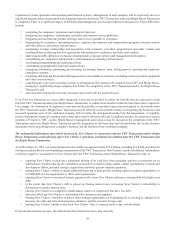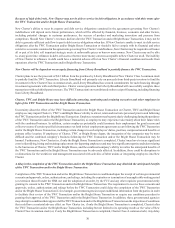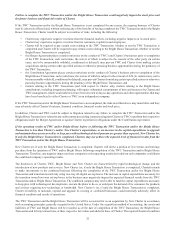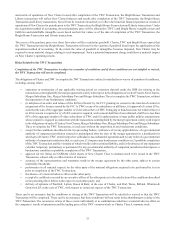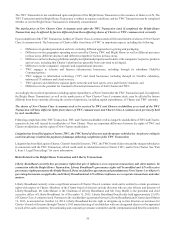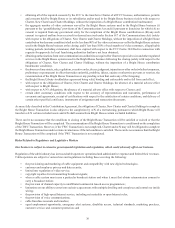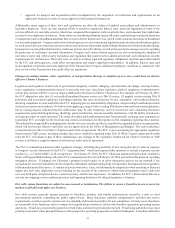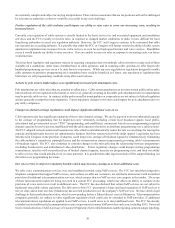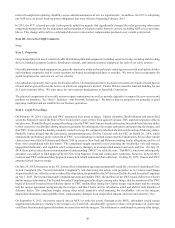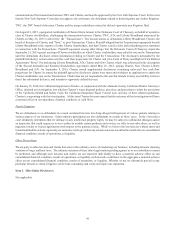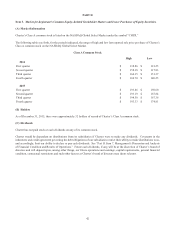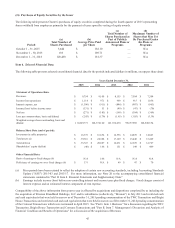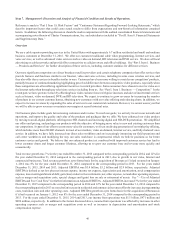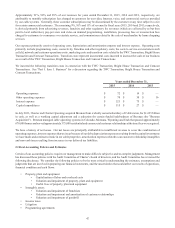Charter 2015 Annual Report Download - page 52
Download and view the complete annual report
Please find page 52 of the 2015 Charter annual report below. You can navigate through the pages in the report by either clicking on the pages listed below, or by using the keyword search tool below to find specific information within the annual report.37
• approval for mergers and acquisitions often accompanied by the imposition of restrictions and requirements on an
applicant's business in order to secure approval of the proposed transaction.
Additionally, many aspects of these laws and regulations are often the subject of judicial proceedings and administrative or
legislative proposals. There are also ongoing efforts to amend or expand the federal, state, and local regulation of some of the
services offered over our cable systems, which may compound the regulatory risks we already face, and proposals that might make
it easier for our employees to unionize. Some states are considering adopting energy efficiency regulations governing the operation
of equipment (such as broadband modems) that we use to deliver Internet services, which could constrain innovation in broadband
services and equipment. Congress and various federal agencies are also considering legislation and rules that would further regulate
us, such as new privacy restrictions and new restrictions on the use of personal and profiling information for behavioral advertising.
In response to recent global data breaches, malicious activity and cyber threats, as well as the general increasing concerns regarding
the protection of consumers’ personal information, Congress and various federal agencies are also considering the adoption of
new data security and cybersecurity legislation and regulation that could result in additional network and information security
requirements for our business. These new laws, as well as existing legal and regulatory obligations, and increased enforcement
by the FCC and other agencies, could affect our operations and require significant expenditures. In addition, federal, state, and
local regulators could deny necessary approval of the Transactions or impose additional regulatory conditions in connection with
their review of the Transactions that could affect our operations.
Changes to existing statutes, rules, regulations, or interpretations thereof, or adoption of new ones, could have an adverse
effect on Charter’s business.
Legislators and regulators at all levels of government frequently consider changing, and sometimes do change, existing statutes,
rules, regulations, or interpretations thereof, or prescribe new ones. Any future legislative, judicial, regulatory or administrative
actions may increase Charter’s costs or impose additional restrictions on Charter’s businesses. For example, on February 26, 2015,
the FCC adopted an order that (1) reclassified broadband Internet service as a Title II service, (2) applied certain existing Title II
provisions and associated regulations (including requiring that rates and practices be just, reasonable, and nondiscriminatory,
allowing complaints in court and before the FCC, imposing privacy and disability obligations, and providing broadband providers
with access to poles and conduits), (3) forbore from applying a range of other existing Title II provisions and associated regulations,
but to varying degrees indicated that this forbearance may be only temporary, and (4) issued new rules expanding disclosure
requirements and prohibiting blocking, throttling, paid prioritization, and unreasonable interference with the ability of end users
and edge providers to reach each other. The order also subjected broadband providers’ Internet traffic exchange rates and practices
to potential FCC oversight for the first time and created a mechanism for third parties to file complaints regarding these matters.
The order has been appealed by multiple parties, but the rules are currently in effect (except for the expanded disclosure requirements,
which will not become effective until they receive approval from the Office of Management and Budget). The order could have
a material adverse effect on Charter’s business and results of operations. The FCC is also considering the appropriate regulatory
framework for VoIP service, including whether that service should be regulated under Title II. While Charter cannot predict what
rules the FCC will adopt as part of these rulemakings, any changes to the regulatory framework for Charter’s Internet or VoIP
services could have a negative impact on its business and results of operations.
The FCC is considering numerous other regulatory changes, including the possibility of new navigation device rules in response
to Congress’ recent elimination of the FCC’s “integration ban,” which had required cable operators to include a separate security
module (i.e., a “CableCARD”) in all set-top boxes. On January 27, 2016, the FCC Chairman announced that he had circulated a
Notice of Proposed Rulemaking to the other FCC commissioners for vote on February 18, 2016 and outlined his proposal regarding
navigation devices. If adopted, the Chairman’s proposal would require us to allow navigation devices on our network if the
navigation devices meet standards to be developed by a third party standard setting body envisioned by the proposed rules regardless
of the manufacturer of the device. It remains uncertain what rules, if any, will ultimately be adopted and what operating or financial
impact any such rules might have on us including on the security of the content we obtain from programmers that is delivered
over any third party navigation device, customer privacy and the user experience. In addition, the FCC’s Enforcement Bureau is
actively investigating various industry practices and imposing forfeitures for alleged regulatory violations.
Our cable system franchises are subject to non-renewal or termination. The failure to renew a franchise in one or more key
markets could adversely affect our business.
Our cable systems generally operate pursuant to franchises, permits, and similar authorizations issued by a state or local
governmental authority controlling the public rights-of-way. Many franchises establish comprehensive facilities and service
requirements, as well as specific customer service standards and monetary penalties for non-compliance. In many cases, franchises
are terminable if the franchisee fails to comply with significant provisions set forth in the franchise agreement governing system
operations. Franchises are generally granted for fixed terms and must be periodically renewed. Franchising authorities may resist
granting a renewal if either past performance or the prospective operating proposal is considered inadequate. Franchise authorities


